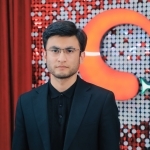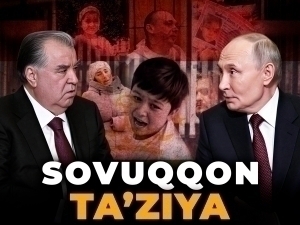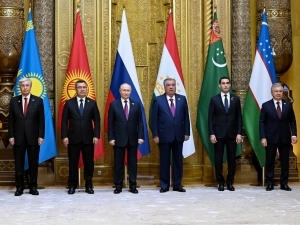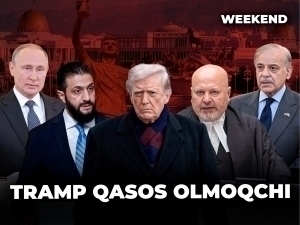Weekend: Nuclear fears grow between India and Pakistan, North Korean soldiers spotlighted
Review
−
28 April 6585 11 minutes
One of the most serious conflicts in the world is in danger of rekindling. There is a possibility that the two nuclear powers, India and Pakistan, will escalate the conflict that began with a terrorist attack into a water war.
Another good news for Palestinian statehood. A very important step taken by France a few weeks ago is gradually expanding today. Therefore, now even one of the Baltic states may recognize Palestine.
North Korean soldiers sent from Pyongyang to support Putin's invasion of Ukraine are again in the spotlight. Their ranks in Kursk are aging. Putin thanked them, and it is not surprising that Kim Jong-un is thinking about how to dispose of the income from these soldiers.
QALAMPIR.UZ’s Weekend program with details of the events that took place in the world over the past week.
Is one of the five “powder kegs” about to explode?
It has been exactly 80 years since the end of World War II. But as soon as this six-year period of destruction ended, several steps were immediately taken on Earth toward the next global war. The first of these was the “hands-on” division of India and Pakistan according to religious majority and the formation of Israel, which has become a “cancer” in the Middle East today. The years 1946-47 were remembered for this. Thus, “two steps” were taken between these years for World War III.
A year later, a serious division also occurred on the Korean Peninsula, and one nation, under the influence of the former Soviet Union and the United States, was divided into two states: North and South Korea. The peninsula thus became one of the next hotbeds of political and military tension on Earth.
A year later, another “geopolitical gunpowder” appeared in China. The Kuomintang Party, led by Chiang Kai-shek, which had come to power many years earlier, lost its chance in a clash with the newly formed Soviet Republic of China. In the 20-year civil war that raged inside the country, the communists, supported by the USSR, won. In 1949, the forces led by Mao Zedong conquered all of China and proclaimed the People’s Republic of China.
The Western-backed forces led by Chiang Kai-shek moved to the island of Taiwan, cut off from the mainland. However, the world community hesitated to establish relations with the new China for many years. Until 1979, they recognized the authority of Taiwan. However, this year everything changed. In a word, Taiwan was betrayed, and the communists began to prioritize relations with China for the outside world. Thus, another “mine” was formed for the explosion of a potential global conflict.
Meanwhile, the “Cold War” began, which shook the world and kept humanity in fear for a very long time. Washington and Moscow began a competition in the arms race — who would win? However, this lasted until 1991. Despite this, the tension in the hotbeds of potential conflict listed above remained.
In modern history, another conflict point was added to these four. The coming to power in Russia of a former intelligence officer with colonial ambitions — Putin — determined the fate of Ukraine today.
Thus, five “gunpowder” points appeared on Earth: China-Taiwan, North and South Korea, the Israeli problem in the Middle East, and the Ukrainian-Russian conflict. Today, despite some changes in these conflicts, including the fact that Iran has replaced the Arab states against Israel, and China’s “finishing off” of Taiwan is only a matter of time, the general situation in tensions is still the same.
In the past, the five hot spots in Eastern Europe and the Middle East have partially exploded. Today, one of the most serious of the above-mentioned conflicts has flared up — the alleged conflict between India and Pakistan. Since both countries are full members of the nuclear club, there are concerns that if this conflict escalates into direct armed confrontation, millions of people could die.
This conflict, which began with a bloody terrorist attack and turned into a water dispute, is currently being met with concern all over the world. The incident took place on April 22 in the beautiful Kashmir region, where at least 26 tourists were killed and more than 20 others were injured in a gunfight. The shooting took place in the town of Pahalgam. Unidentified gunmen opened fire on tourists walking along a trail in the Baisaran Valley.
India classified the incident as a terrorist attack and blamed Pakistan, with Prime Minister Modi taking it seriously. India began taking measures against Pakistan, accusing it of supporting terrorist groups in Kashmir.
Initially, it was announced that the main checkpoint called Attari, located on the border with Pakistan, would be closed. It also suspended the 1960 Indus River Agreement, which guaranteed Pakistan access to water resources despite political and military conflicts. This agreement is now considered ineffective until Pakistan makes a firm and clear statement that it “does not support international terrorism.”
The visa-free entry program within the South Asian Association for Regional Cooperation (SAARC) has also been suspended for Pakistani citizens. All previously issued SPES visas have been canceled, and Pakistani citizens who are in India with these visas must leave the country within 48 hours.
But Pakistan has not remained silent either. It responded immediately to India. In particular, the country's airspace has been closed to Indian airlines, and bilateral trade has been suspended. Official Islamabad also called on India to refrain from any intention to divert the flow of water. Otherwise, it warned that this action would be considered a declaration of war.
These measures were taken after India unilaterally terminated the six-decade-old Indus Water Sharing Agreement and made other sharp decisions. India took these decisions after a terrorist attack on tourists in Jammu and Kashmir. In this attack, 26 people, including a Nepalese citizen, were killed.
India accuses Pakistan of the attack, while official Islamabad categorically denies this accusation, calling it a "false flag operation." Shortly after, India completely blocked the flow of the Indus River into Pakistan, closing all four locks that regulate the flow of water through dams and canals. This was the first time since the Indus Waters Treaty was signed several decades ago.
At almost the same time, Indian and Pakistani soldiers exchanged fire along the Line of Control in Jammu and Kashmir. This incident occurred a few hours before the visit of the Indian Army Chief, General Upendra Dwivedi, to Srinagar and Udhampur. Delhi and Islamabad accused each other of violating the ceasefire.
On April 25, Pakistani Defense Minister Khawaja Asif announced on Sky News that he was ready for war with India. After that, officials from both countries switched to threatening rhetoric toward each other. One of the Pakistani officials said that the country's nuclear arsenal was created specifically for possible Indian aggression.
And the tension has not subsided to this day. The world community is calling on India and Pakistan, both nuclear-armed states, to peacefully end this conflict that could cost millions of lives. After all, this is a very important and vital necessity for countries with populations of 1.4 billion and 260 million, respectively.
For information, the Kashmir region is a disputed territory between India and Pakistan. Here, after the invasion, China also has its territory of control. However, a large part of Kashmir is divided between Pakistan and India. The southeastern part of the region is officially controlled by Delhi, and the northwest is controlled by Islamabad.
India, in turn, accuses Pakistan of using militants in this region. In its view, Islamabad "sponsors" extremists in Kashmir. Pakistan denies these accusations. According to the Indian government, 44 people were killed in militant attacks in Kashmir between April and October 2024.
The number of people recognizing Palestine is increasing
The number of countries that may recognize Palestine is increasing. After the unexpected statement made by the President of France a few weeks ago, the number of those who follow him is increasing. Now the pitiful cries of genocide and inhumanity in the Middle East have also been "heard" in the Baltic.
In particular, Lithuania did not rule out the possibility of recognizing Palestine once the conditions for a ceasefire between Israel and Hamas and the release of all prisoners come into force. This was stated by the country's Foreign Minister Kęstutis Budris in an interview with journalists.
According to Budris, the top priority should be to reach a ceasefire between Israel and Hamas and release the hostages, as well as develop a "roadmap" that will lead to stability in the region. He added that Lithuania is closely following France’s initiatives and the decisions of other countries.
This means that Lithuania is very cautiously following France, the current real leader of the European Union, and if Paris decides to recognize Palestine in the near future, Lithuania will follow. Three weeks ago, Emmanuel Macron, during his official visit to Egypt, announced that he would organize an international conference on the two-state solution shortly together with Saudi Arabia.
Macron said that France could recognize the state of Palestine soon within the framework of this conference. Most interestingly, he confirmed last year that there is no such obstacle in France.
The reason for the European leader's decision was the inhuman actions of Israel in Gaza since October 7, 2023. For information, it is also worth noting that in May last year, three countries on the continent — Spain, Ireland, and Norway — officially recognized the state of Palestine. This brought the number of countries that have recognized Palestinian statehood to more than 140.
Kim and Putin “clinked glasses”
As you may recall, in October 2024, there were reports that 10,000 to 12,000 North Korean soldiers had arrived in Russia. Putin admitted this at the end of the year. Kim Jong-un admitted this only at the end of April this year after almost the whole world learned that his soldiers had participated in the invasion of Ukraine.
The North Korean dictator called the participation of his Armed Forces in this operation “a sacred mission to monolithically strengthen the traditional friendship and solidarity between the DPRK and Russia.” It is noted that in Pyongyang, a “Monument of Military Glory” will be erected in memory of the North Korean soldiers who died in the battles for the Kursk region.
At the same time, Russian President Vladimir Putin also expressed gratitude to North Korean leader Kim Jong-un and the entire leadership of North Korea for the assistance provided by Korean soldiers in the battles in the Kursk region. According to Putin, the actions of the North Korean soldiers in Kursk allegedly do not contradict the norms of international law. The Russian leader also noted the high level of training and dedication of the Korean soldiers.
Thus, Russia has almost achieved its goals in Kursk, and the “helpers” from Pyongyang played an important role in this.
In general, the cooperation between North Korea and Russia in the field of military assistance, reaching the point of sending soldiers to each other, goes back to the agreement between them. In particular, such closeness between the DPRK and Russia was achieved thanks to the Treaty on Comprehensive Strategic Partnership.
Kim Jong-un justified the military intervention of his forces in Kursk by this treaty and its Article 4. He even called this action a “sacred mission to monolithically strengthen traditional friendship and solidarity.”
For information, the President of Ukraine reported that the North Korean military lost a total of 4,000 soldiers, including wounded and dead, during the battles in the Kursk region. Similar figures are currently estimated by the South Korean Joint Chiefs of Staff. However, it is not difficult to understand that the Kim regime is not interested in such figures, given the totalitarian regime that has been in place for so many years.
In general, it is no exaggeration to say that the participation of North Korean soldiers in the Russian invasion of Ukraine is an exchange of lives and material resources. According to the KIDA analytical center, North Korea received money and technical assistance from Russia in exchange for such assistance, including modern military technology, nuclear submarines and modern fighter jets.
The total amount received in cash for military products such as artillery shells, anti-tank grenade launchers, and ballistic missiles supplied to Russia was said to be more than $20 billion. According to some reports, Pyongyang sent 21,000 containers to Russia by sea, and additional supplies may have been carried out by land and air. In addition, the Kim regime earned $280 million by putting the lives of military personnel in Russian hands.
The $2,000 monthly salary paid by Russia to North Korean soldiers was also confiscated by the North Korean government.




